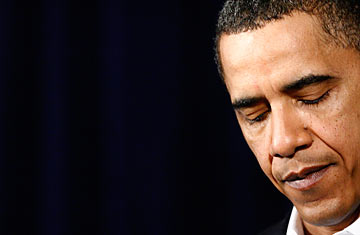
Even before the polls opened Tuesday in Massachusetts, Democrats were already talking about what had gone wrong — not just in the Bay State, where Republican Scott Brown ended up winning the so-called Kennedy seat, but with Obama's entire first year in office.
In an interview Sunday, Jan. 17, with a Tampa Bay television station, Florida Democratic Senator Bill Nelson blamed the current state of his party on overconfidence after the 2008 election. "The Obama organization felt so confident coming out of the huge election victory that they felt like they could tackle the health care reform, which has not been done in over five decades, and I think they miscalculated, because the economy came front and center."
The frustration is shown in polls, in campaign signs on the south side of Boston and in the indigestion of Democrats preparing for 2010. So what went wrong? Here are five explanations you will see batted about over the next few weeks — all of which tell at least part of the story:
1. The challenges were just too big for any one man. The thinking here is pretty straightforward: Obama was not elected Emperor. He was elected President, subject to the onerous balance of powers, in a hyper-partisan age, with only slight Democratic majorities in the House and Senate, an enormously well-oiled lobbying industry and a divided Democratic party. Even if the President's policies prevented financial catastrophe, there was no quick fix available to forestall the long period of economic struggle that has followed. The most commonly recommended solution, massive government stimulus, carried with it its own political downside, as polls show significant voter unease with the massive deficits.
2. Crises are not opportunities; they are just crises. If the Obama Administration had a mantra coming into office, it was this: Don't waste a crisis. As Larry Summers said in January 2009, "Any study of history reveals that with crisis comes enormous fluidity in the system." In other words, when the going gets rough, go big. It all sounded great at the time, but it was flat wrong. In a time of economic suffering, the American people want a President who focuses on one thing, and one thing only — improving their lives in the short term. They stop caring so much about global warming or health care reforms that won't take effect until 2013.
3. The Obama mandate was not what it seemed. No one can doubt the wave of enthusiasm that brought Obama to office, but many have been surprised by just how quickly the independent voters who supported Obama in 2008 have turned against him. In New Jersey, Virginia and now Massachusetts, independents have sided with Republicans during the past six months, continuing their longtime dissatisfaction with whoever holds power in Washington. In a press briefing Tuesday, White House spokesman Robert Gibbs seemed to lend support to this idea. "In many ways we're here because of that upset and anger," Gibbs said of the frustration driving independent support to Republican Scott Brown's campaign. "That upset and anger, quite frankly, dates much farther back than simply the 2008 election. That's not to talk about any previous Administration, except for quite some time, the middle class has thought that Washington was looking out for Washington and the big special interests and not looking out for them." As soon as Obama settled into office, voters decided he wasn't the change they wanted.
4. Health care is just too hard. It was the third rail that burned the last Democratic president, Bill Clinton, in his first years in office. It strikes at emotional pressure points that make reasoned debate difficult to maintain. And it involves too many powerful interest groups — doctors, hospitals, drug companies, the elderly — who have countervailing interests, making compromise almost impossible. The nation's founders designed a government that moved slowly, making the task of taking on an issue as big and complicated as health care more than the system could bear.
5. Americans just don't like government. "Americans are an unusual people," New York Times columnist David Brooks argued Tuesday. "They seem to want a government that is helpful but not imperious, strong but not subordinate." A cynic might put it differently — that Americans want all the benefits of government without having to pay much for it. Obama's belief in the power of government, combined with the major government interventions required by the financial crises, spooked many voters, who worried about the trillions of dollars in additional government spending required by the stimulus efforts and health care reform.
